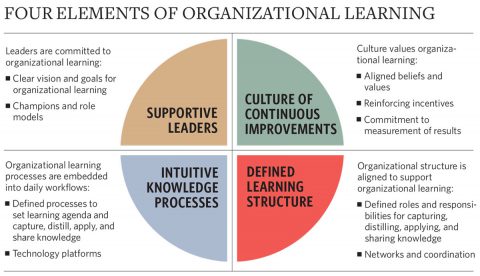What is Giving Compass?
We connect donors to learning resources and ways to support community-led solutions. Learn more about us.
Giving Compass' Take:
• The Bridgespan Group explores the topic of "organizational learning," which is exactly what it sounds like — orgs reflecting on what makes them tick and how to do things better.
• What are the biggest obstacles to this practice? Lack of incentive and poor processes are two of the main ones, but they can be easily surmounted if there's buy-in across the board.
• Here's how we can all think differently about assessment.
Disseminating insights and know-how across any organization is critical to improving performance, but nonprofits struggle to implement organizational learning and make it a priority. A recent study found three common barriers to knowledge sharing across nonprofits and their networks, as well as ways and means to overcome them.
Reinventing the wheel — this well-worn phrase describes one of the oldest of human follies: undertaking a project or activity without tapping into the knowledge that already exists within a culture or community. Individuals are blessed with a brain that, some of the time, remembers what we’ve already learned — or at least that we’ve learned something. But what about organizations?
 Consider the views of Kim Oakes, director of sharing and communities of practice at the Knowledge Is Power Program (KIPP), a national network of 99 charter schools serving 27,000 students via 1,900 teachers. Oakes told Bridgespan’s research team: “We know that about 80 percent of our teachers create materials from scratch. … It became increasingly important to connect our teachers, so that they could build upon one another’s ideas rather than work in isolation.”
Consider the views of Kim Oakes, director of sharing and communities of practice at the Knowledge Is Power Program (KIPP), a national network of 99 charter schools serving 27,000 students via 1,900 teachers. Oakes told Bridgespan’s research team: “We know that about 80 percent of our teachers create materials from scratch. … It became increasingly important to connect our teachers, so that they could build upon one another’s ideas rather than work in isolation.”
Or consider World Vision, an international Christian development organization with an annual budget of more than $2 billion operating in 93 countries. World Vision was facing the consequences of rapid growth. In the words of Eleanor Monbiot, its senior director for knowledge management: “We were growing at 10 to 15 percent a year. We had moved from everybody knowing each other vaguely, to a breaking point. … The No. 1 need was to know what people were up to, where the best practices lay.”
KIPP, World Vision, and a host of other nonprofits, large and small, are tackling the challenge of making their organizations as smart as the individuals who constitute them. In short, they are engaging in the hard work of organizational learning: The intentional practice of collecting information, reflecting on it, and sharing the findings, to improve the performance of an organization.
Read the full article about the challenge of organizational learning by Katie Smith Milway andAmy Saxton at The Bridgespan Group.